Do Cats Benefit From Early Socialization With Dogs?
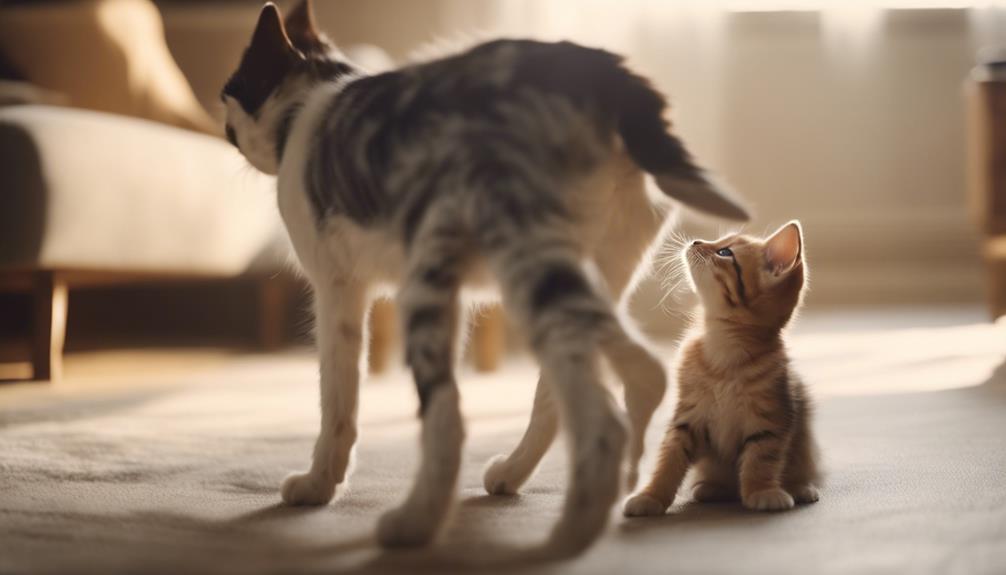
Early socialization between cats and dogs can have several potential benefits, such as reducing fear and aggression towards each other, improving their ability to coexist peacefully in the same household, and promoting better social skills. However, it is essential to consider the individual personalities and temperaments of both animals, as well as their past experiences and any potential underlying health issues. Gradual and supervised introductions, positive reinforcement, and respecting the boundaries of each pet are crucial factors in successful socialization. Ultimately, the overall success of early socialization between cats and dogs depends on careful planning, patience, and consistent training efforts from their owners.
—
In conclusion, while early socialization between cats and dogs can be beneficial, it is important to approach this process with caution and consideration for the unique needs of each animal. By following best practices for introduction and training, pet owners can help foster a positive relationship between their cat and dog, leading to a harmonious coexistence in the household.
Importance of Early Socialization
Early socialization with dogs is crucial for shaping a cat's behavior and ability to interact positively with other animals. Training techniques play a vital role in this process, as they help establish boundaries and teach cats how to communicate effectively with their canine counterparts. Through early exposure to dogs, cats develop important behavioral skills that enable them to navigate social situations confidently.
Moreover, bonding experiences between cats and dogs foster emotional connections that are beneficial for their long-term relationship. These interactions help build trust and understanding between the two species, leading to a harmonious coexistence. Cats that have been socialized with dogs from a young age are more likely to display friendly and accepting behaviors towards other animals, demonstrating the positive impact of early socialization on their overall behavioral development.
Effects on Feline Behavior

Early socialization with dogs can lead to significant behavior changes in felines, influencing their interactions with other animals and humans.
This socialization process can also foster social bonding between cats and dogs, potentially enhancing their overall well-being and quality of life.
Furthermore, it may help reduce anxiety levels in cats, promoting a more relaxed and harmonious environment within multi-species households.
Behavior Changes
How do interactions with dogs during early socialization periods affect the behavior of cats in the long term?
Early exposure to dogs can lead to behavior modification in cats. Through positive interactions, cats can learn to be more sociable and less fearful, enhancing their overall behavior.
Relationship building between cats and dogs during critical developmental stages can help cats become more adaptable to different situations and environments. They may exhibit reduced stress responses when encountering new animals or experiences.
Additionally, cats that have been socialized with dogs early on may display increased confidence and improved communication skills.
Social Bonding
What impact does social bonding with dogs have on feline behavior in the long term?
When cats engage in trust-building activities with dogs, it can significantly enhance their communication skills and overall behavior. Social bonding between cats and dogs can lead to increased trust levels, which can positively impact a cat's confidence and sociability.
Through interactions with dogs, cats learn to interpret body language, vocal cues, and establish non-verbal communication, which can help them navigate various social situations more effectively. This enhanced communication can also reduce the likelihood of misunderstandings or conflicts between cats and dogs.
Ultimately, social bonding with dogs can contribute to a more well-adjusted and socially adept feline companion, highlighting the importance of early interactions for long-term behavioral benefits.
Anxiety Reduction
Engaging in social bonding activities with dogs has been shown to significantly reduce anxiety levels in cats, positively impacting their overall behavior and emotional well-being.
This stress reduction and increase in comfort stem from the calming presence of dogs, which can help cats manage their anxiety more effectively. Through interactions with dogs, cats can learn to trust and feel more secure in various situations, leading to improved anxiety management over time.
Building trust with dogs can provide cats with a sense of companionship and support, further contributing to their emotional well-being. Overall, early socialization with dogs can play a crucial role in helping cats develop coping mechanisms for anxiety and fostering a more relaxed and content demeanor.
Benefits for Social Skills
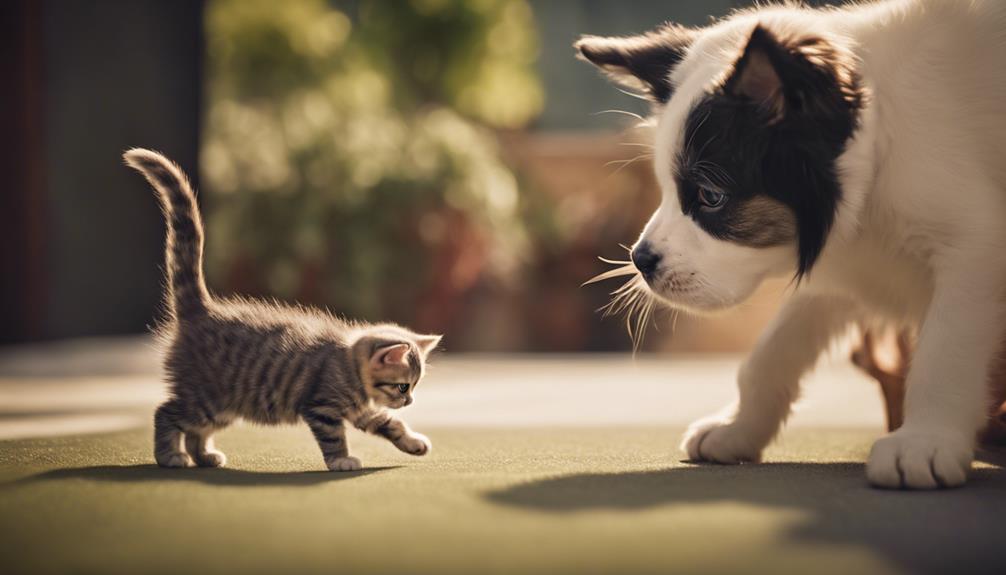
Early socialization with dogs has been shown to significantly enhance cats' social skills, fostering improved interactions with other animals and humans alike. When cats are exposed to dogs from a young age, they learn valuable communication skills that help them navigate various social situations. This early interaction teaches cats how to interpret body language, vocal cues, and other forms of communication, leading to improved communication not only with dogs but also with other cats and humans.
Furthermore, socializing with dogs can enhance cats' relationships with other animals. Cats that have been socialized with dogs tend to display less aggression and fear towards unfamiliar animals, resulting in more harmonious interactions. This improved ability to get along with other animals can lead to a more enriched and fulfilling social life for cats.
Impact on Overall Well-Being
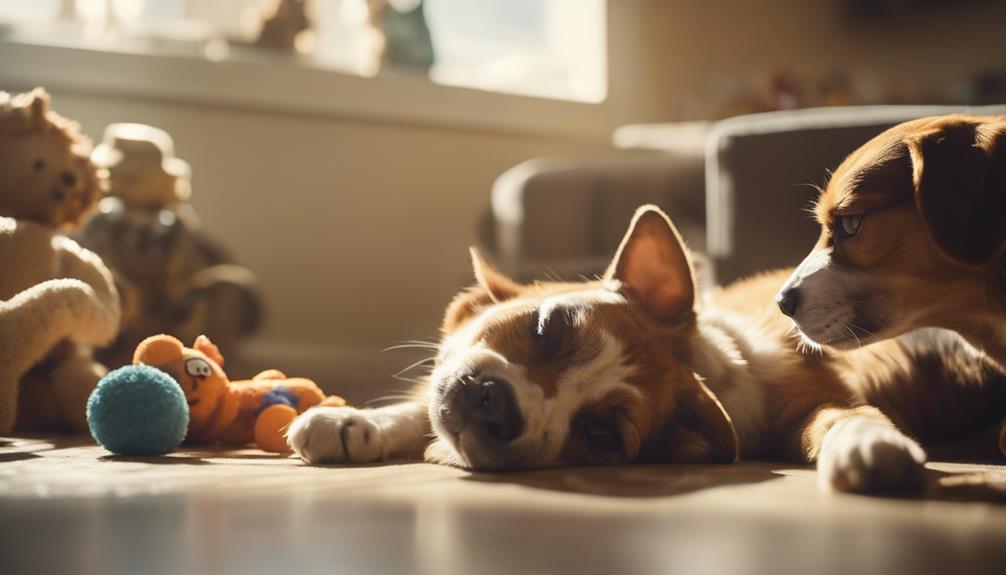
Socializing with dogs not only enhances cats' social skills but also positively impacts their overall well-being by fostering harmonious interactions with other animals and humans. This interaction plays a crucial role in the mental health and emotional development of cats, leading to a more fulfilling and enriched life.
- Mental Health: Interacting with dogs from an early age can significantly improve the mental well-being of cats. It provides them with mental stimulation, reducing the risk of behavioral issues and promoting a healthier mindset.
- Socialization Benefits: Cats exposed to dogs tend to be more social and adaptable to various environments, enhancing their overall quality of life. This socialization helps them feel more comfortable in new situations and around different individuals.
- Stress Reduction: The presence of a dog can help alleviate stress in cats, promoting a sense of security and companionship. This can lead to reduced anxiety levels and a more relaxed demeanor in feline companions.
Expert Opinions and Research
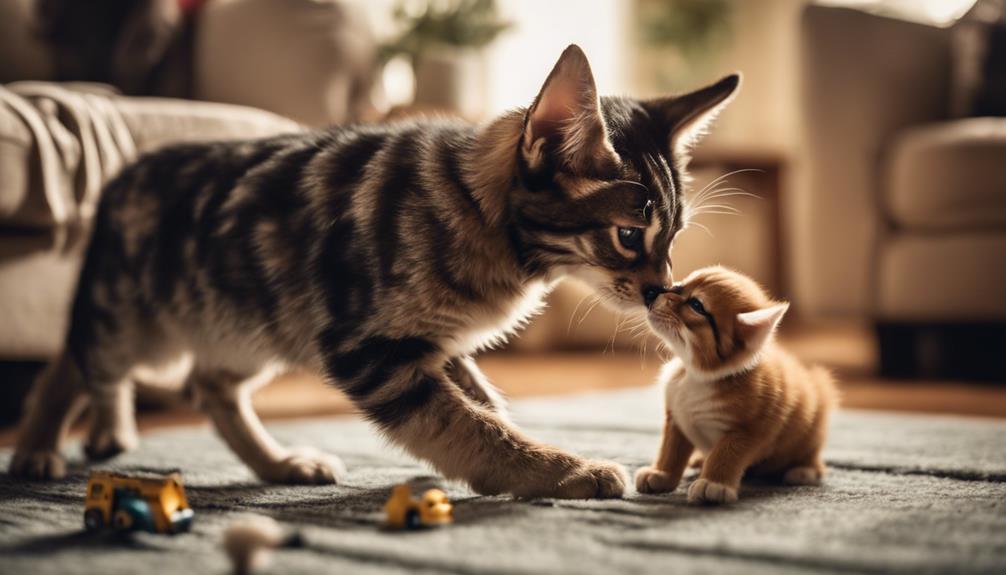
What do experts and research indicate about the impact of early interactions between cats and dogs on their social development and behavior?
Studies have shown that early exposure to dogs can positively influence a cat's social development and behavior. Canine companionship can help cats become more adaptable to different social situations, potentially reducing fear and aggression towards other animals. Additionally, feline friendships with dogs can provide cats with companionship and mental stimulation, leading to overall improved well-being.
Experts emphasize the importance of supervised and gradual introductions between cats and dogs. Proper introductions can help establish positive associations between the two animals, fostering a harmonious relationship. Research suggests that cats who are socialized with dogs from a young age tend to display less stress-related behaviors and are more likely to engage in social interactions with other animals.
Tips for Successful Introductions

Successful introductions between cats and dogs can greatly benefit from positive strategies. Understanding the benefits of cat-dog socialization, recognizing the importance of early interactions, and employing effective introduction techniques are key components for a harmonious relationship between these pets.
It's crucial to approach these interactions with care and consideration for the unique needs of each animal.
Cat-Dog Socialization Benefits
How can early socialization between cats and dogs positively impact their long-term relationship dynamics and overall well-being? When considering the benefits of cat-dog socialization, several key points emerge:
- Enhanced Behavioral Development: Early interactions foster positive behaviors in both cats and dogs, leading to improved social skills and reduced aggression.
- Stronger Emotional Connections: Building a foundation of trust and companionship through early socialization enhances the emotional bond between cats and dogs, promoting a harmonious coexistence.
- Playtime Benefits: Engaging in playful interactions from a young age not only enriches their lives but also strengthens their relationship, leading to a more fulfilling companionship in the long run.
Early Interactions Importance
Early interactions play a crucial role in shaping the long-term relationship dynamics between cats and dogs, setting the foundation for their future interactions and overall well-being. Behavioral development and early bonding are significantly influenced by these initial encounters. Positive interactions during this critical period help foster social skills in both cats and dogs, enhancing their ability to communicate and coexist harmoniously. Below is a table outlining the key aspects of successful introductions between cats and dogs:
| Tips for Successful Introductions | Description |
|---|---|
| Slow and Controlled Approach | Gradual introduction in a calm environment |
| Positive Reinforcement | Rewarding desirable behaviors |
| Supervision | Monitoring interactions to ensure safety |
| Patience and Consistency | Allowing time for adjustment and maintaining routines |
These strategies support the development of a strong foundation for a healthy cat-dog relationship.
Positive Introduction Strategies
Implementing gradual and controlled introductions in a calm environment is essential for fostering positive interactions between cats and dogs. Training techniques and gradual acclimation play a crucial role in ensuring a successful introduction.
Positive reinforcement, such as treats and praise, can help create a positive association between the two animals during their initial interactions. Supervised interactions allow for immediate intervention if tensions arise, ensuring the safety of both pets.
It's vital to monitor body language and behavior cues from both animals during these introductions to gauge their comfort levels and make adjustments as needed. By following these strategies, pet owners can increase the likelihood of a harmonious relationship between their cat and dog.
Considerations for Cat-Dog Dynamics
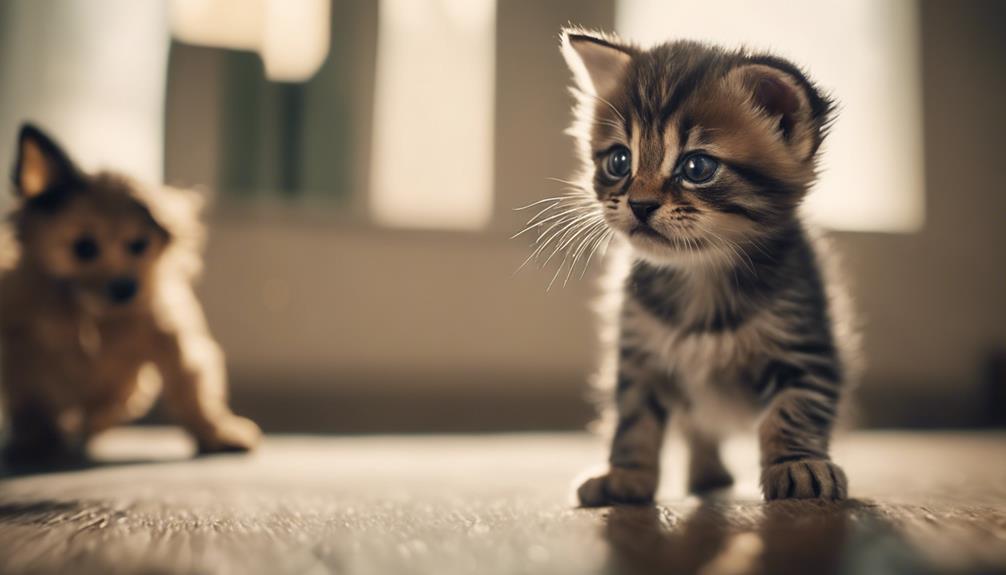
When considering cat-dog dynamics, key factors that influence their interactions include pet compatibility, behavior dynamics, and understanding individual personalities and socialization experiences. Cats and dogs have different communication styles and body language, which can lead to misunderstandings if not addressed. Creating a harmonious inter-species relationship requires patience, positive reinforcement, and gradual introductions.
Factors such as age, breed, and past experiences of both the cat and dog can impact their dynamic. For example, a young cat exposed to dogs early may be more accepting of a new canine companion. Conversely, an older dog unfamiliar with cats may need time and guidance to adapt to a feline housemate. By considering these elements and providing a supportive environment, pet owners can foster positive relationships between their cats and dogs, promoting family harmony.
Frequently Asked Questions
Can Early Socialization With Dogs Help Prevent Aggressive Behavior in Cats?
Early socialization with dogs can positively impact a cat's behavior, reducing the likelihood of aggressive tendencies. This inter-species relationship fosters social skills and can lead to behavior modification in cats. Aggression prevention is a potential benefit.
Are Certain Dog Breeds Better Suited for Socializing With Cats Than Others?
When considering breed compatibility for socializing cats with dogs, behavior outcomes vary. By employing effective training techniques and gradual integration methods, owners can foster positive relationships between feline and canine companions, enhancing their overall well-being.
How Can I Tell if My Cat Is Benefiting From Early Socialization With Dogs?
Observing a cat's body language and communication during play and interaction with dogs can indicate if the early socialization benefits them. Positive signs include relaxed posture, curiosity, and mutual grooming, showing a healthy bond.
Are There Specific Age Ranges Where Early Socialization With Dogs Is Most Effective for Cats?
Optimal timing for early socialization with dogs in cats may vary, but generally, it's most effective during kittenhood. This period fosters positive long-term effects on behavioral changes and relationship dynamics, shaping a more sociable and adaptable feline.
What Are Some Potential Drawbacks or Risks of Early Socialization With Dogs for Cats?
Socialization risks can lead to negative interactions and trust issues between cats and dogs. Behavioral challenges may arise if not managed properly. Understanding potential drawbacks is crucial for successful early introductions between these pets.











